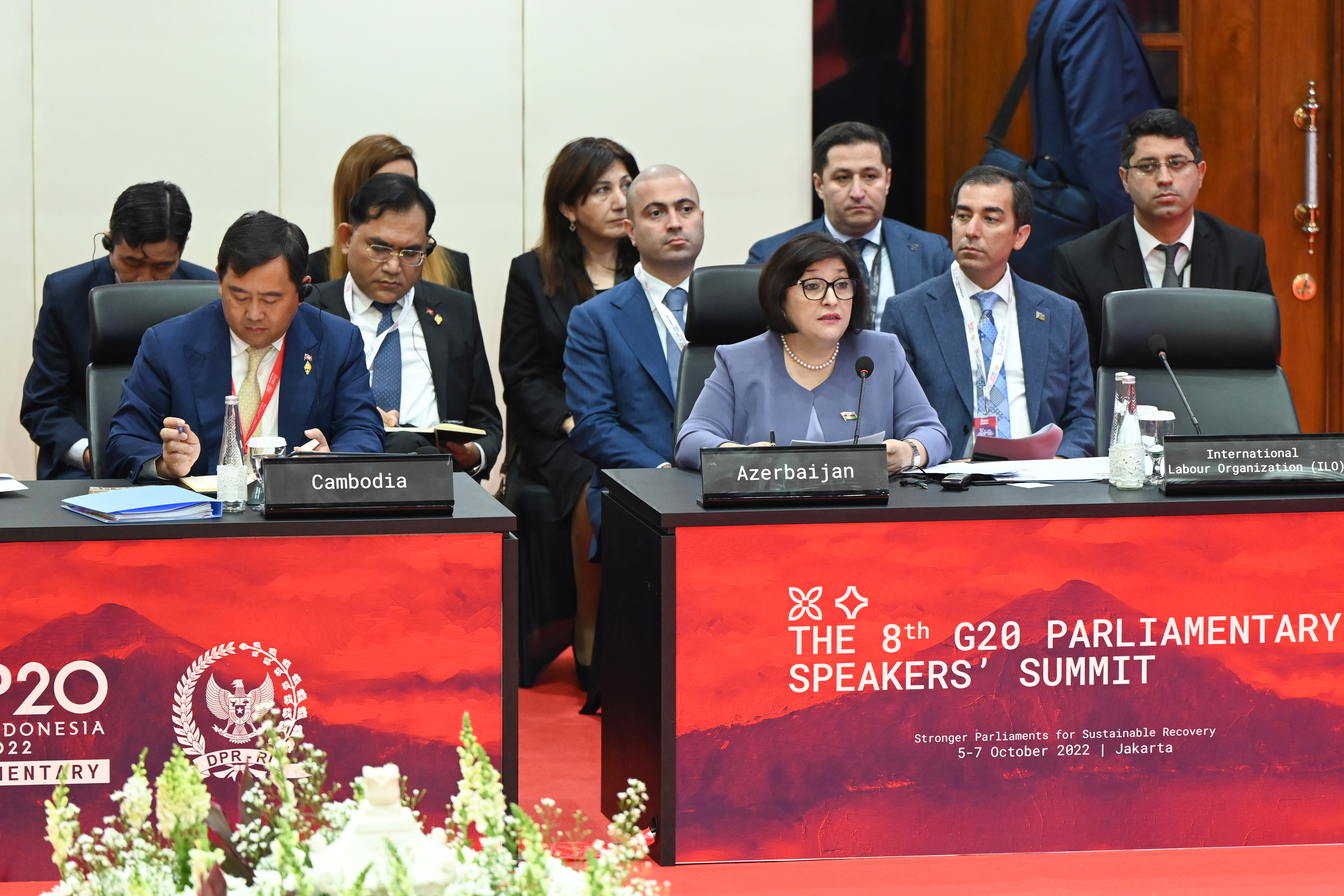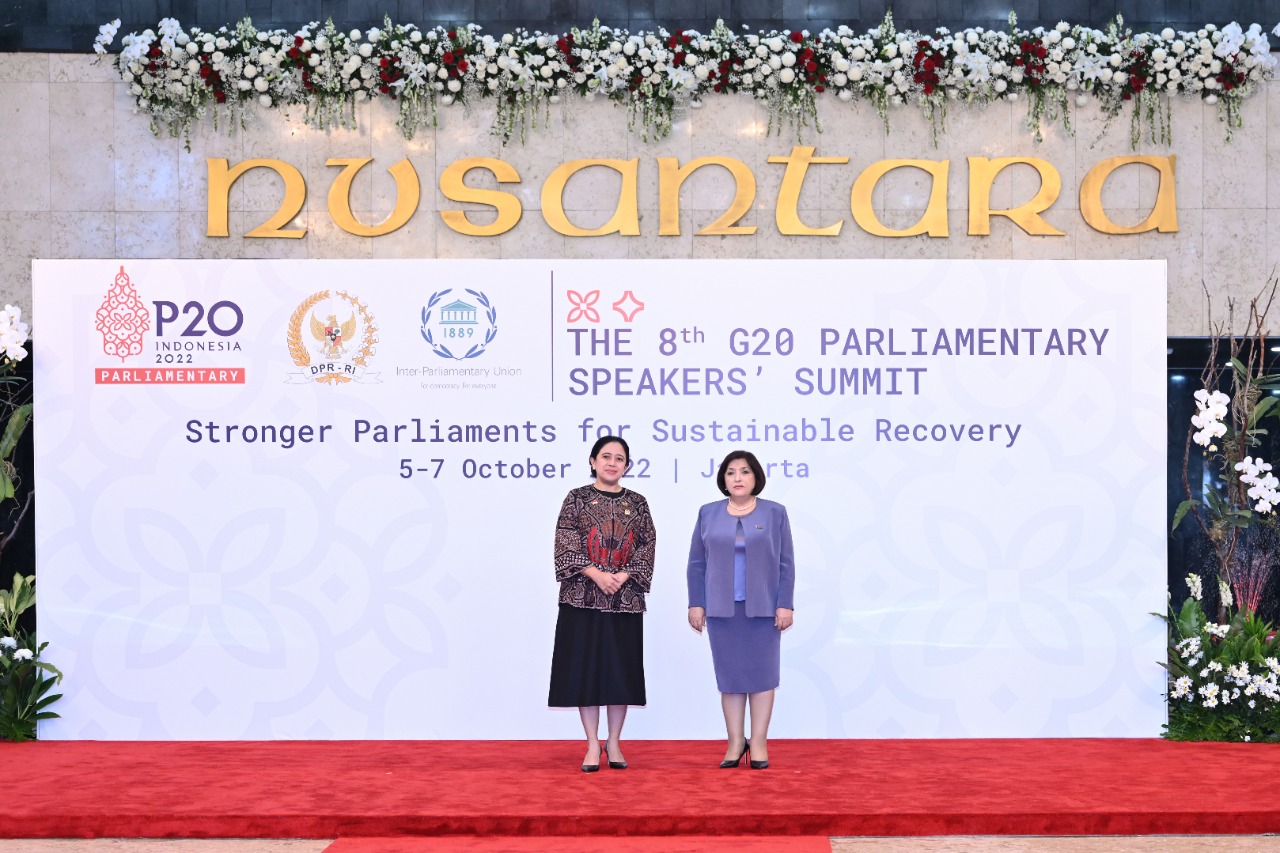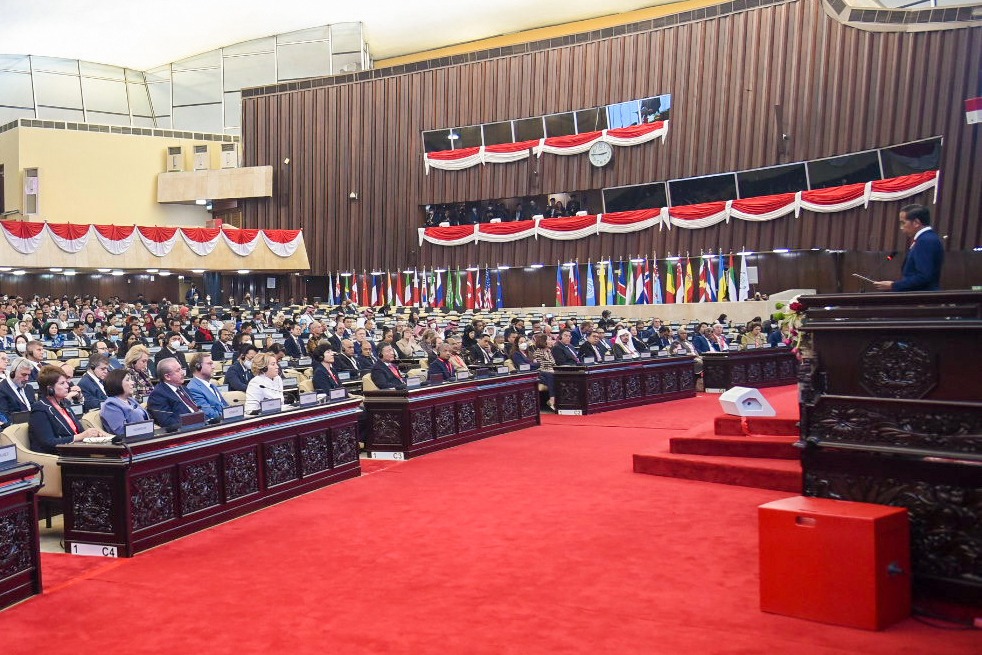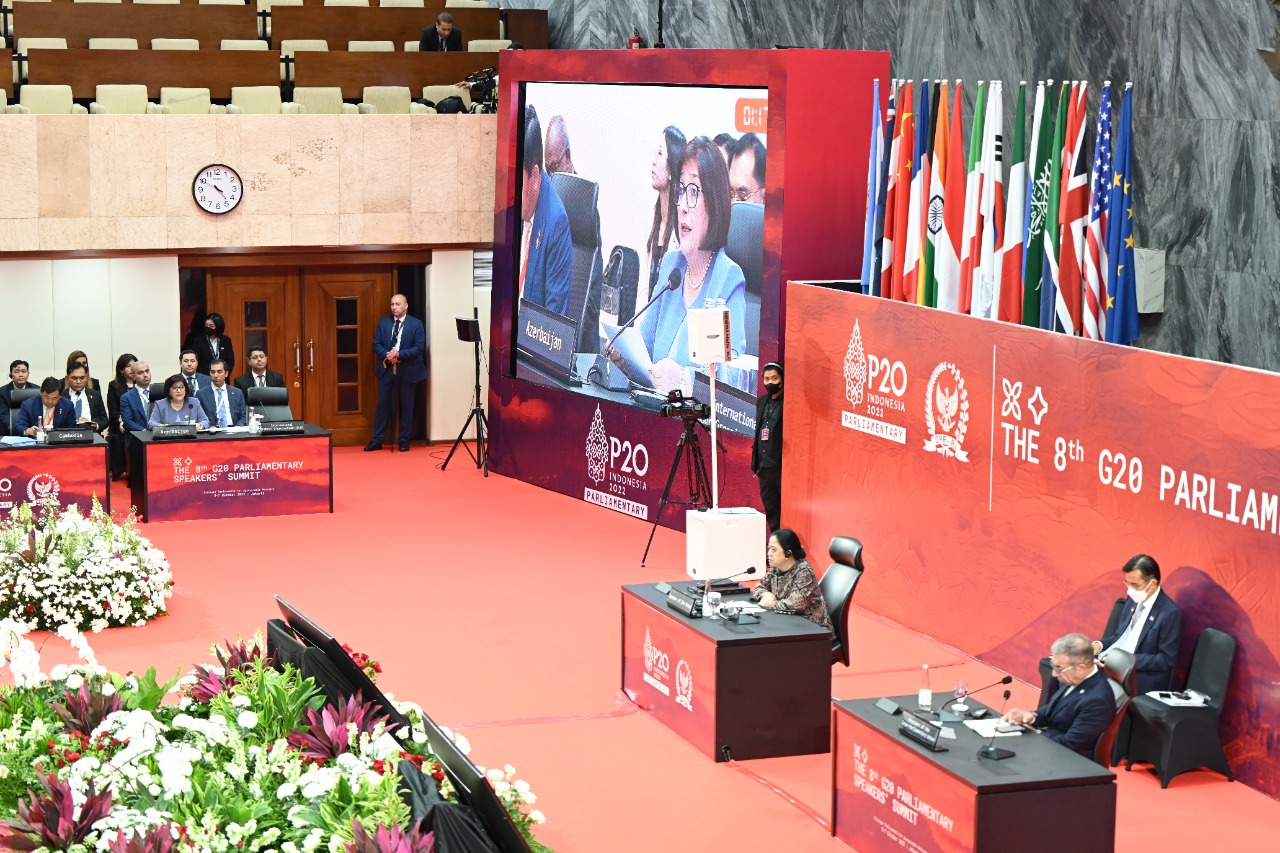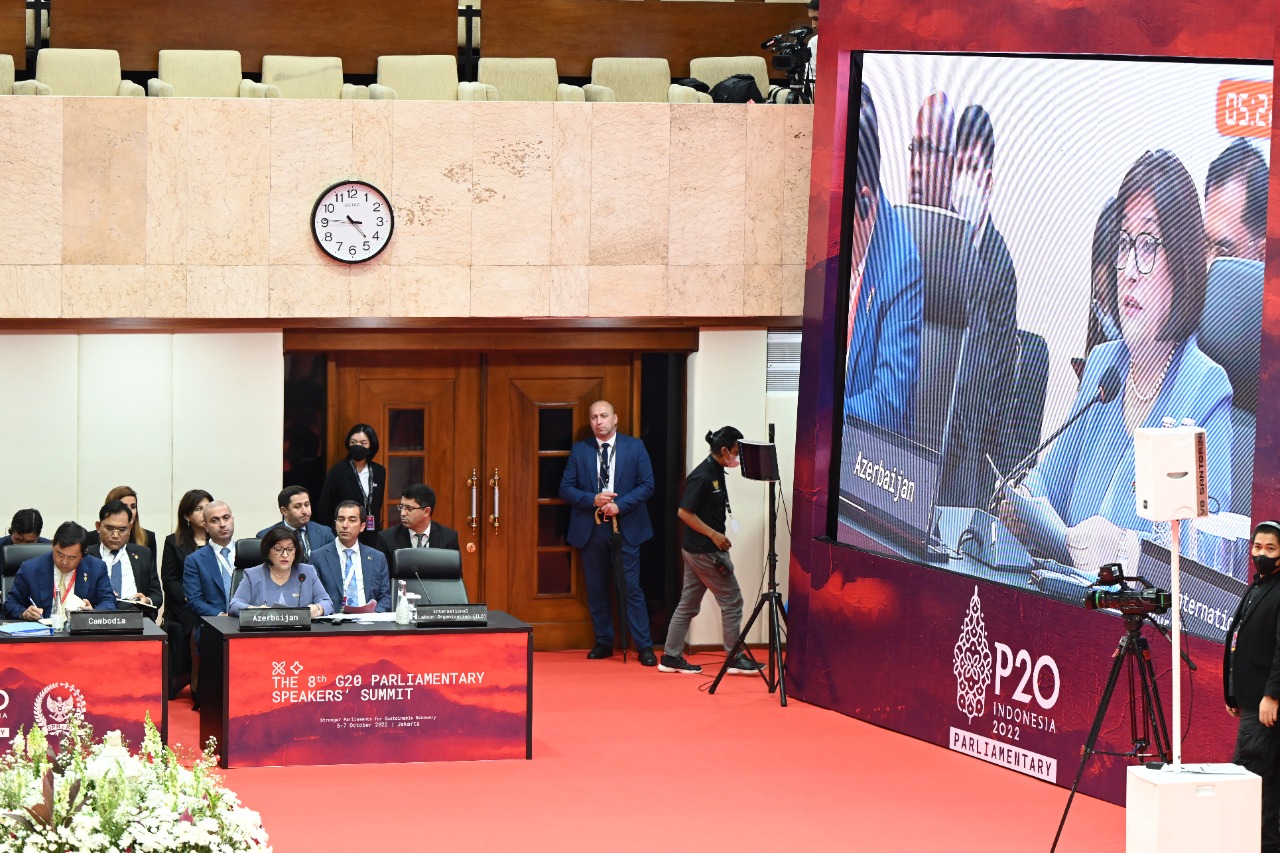Chair of Milli Majlis Sahiba Gafarova Speaks of Modern Global Challenges at P20 8th Summit
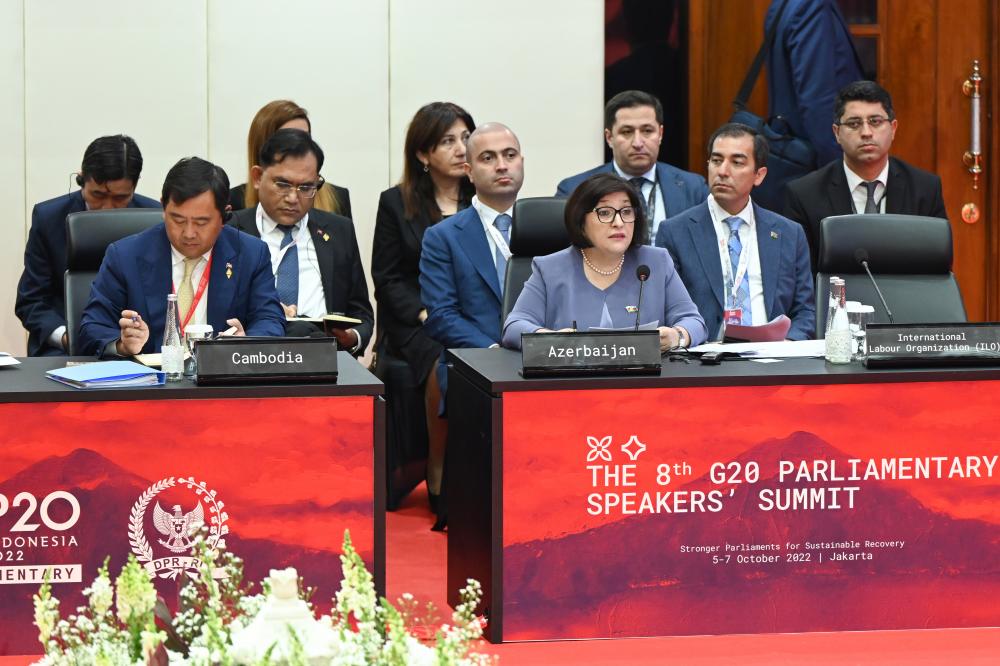
We have reported that Chair of the Milli Majlis Sahiba Gafarova is now in Jakarta on a working trip to take part in the 8th summit of the G20 countries’ parliaments (P20). The P20 summit’s opening ceremony took place on 6 October.
The Chair of the Milli Majlis spoke at the assembly about food and energy security as well as about economic challenges. She underscored the tremendous contribution that the gatherings like the current one brought to the cause of reinforcing global solidarity, co-operation and multilateralism, and stressed the need in parliaments’ active approach to the discussion of the subjects of universal concern.
The humankind is facing the complex and interlinked problems in the modern age. The adverse consequences of COVID-19 and economic complications are aggravating the other challenges that are difficult to handle as it is. Especially, energy security and food security have come to top the agendas of many countries. The international community is attempting to respond to the situation with urgent but short-term arrangements whereas systemic and more stable and longer-term approaches should rather be used in order that sustainable restoration is attained, in the opinion of Sahiba Gafarova who, in this relation, touched on the importance of the Sustainable Development Goals. The said approaches’ position as an all-embracing platform could bring about yet broader joint endeavours and collective undertakings whilst bearing well on the international co-operation aiming to achieve the SDG, Mrs Gafarova said.
Going further, Sahiba Gafarova told her audience of parliaments taking part in this process alongside the engagement of governments. There are the opportunities to optimise inter-legislature co-operation in law-making, budgeting and budget control and, especially prominently, in exchanging the advance experience. At the same time, the co-operation amongst the specialist committees of our parliaments would make our work more profound by making it more concrete and result-oriented, Mrs Gafarova continued.
The Chair of the Milli Majlis stressed that no one country was insured against food security-caused complications, which is why it is the demand of the age that agriculture be developed and a greater self-sufficiency in staple foodstuffs be secured. Agrarian investments and backing the private sector take on an added and special importance against the background of the current economic challenges and in the context also of the post-COVID-19 reclamation. Besides, agriculture matters in terms of employment; streamlining the state support mechanisms for the agrarian sector ought to become the focal point of the parliament-government co-operation in budgeting processes, according to Sahiba Gafarova.
As she was telling the summit participants of the relevant work done in Azerbaijan, Mrs Gafarova drew their attention to the fact that such steps taken in our country as state investments, subsidies, tax-exemption of farming and soft loans had made it possible to reach a considerable rise in food production. She also mentioned the appropriate legislative moves of the Milli Majlis in regard to food security – for instance, the law passed in May this year to provide legal regulation of the concerned area.
Energy security is the topmost issue on the global agenda today, Mrs Gafarova went on. Being a producer of oil and gas, Azerbaijan maintains her own energy security entirely and more – she occupies a serious position within the system of energy security provisions for her partners. For longer than a decade, Azerbaijan has also been a dependable supplier of oil and gas to world markets. The energy projects undertaken upon the instance of our country, such as the oil pipelines splicing the Caspian, Black and Mediterranean seas together and the South Gas Corridor pumping the Azerbaijani gas to Europe, have completely altered the energy maps of the region and of Europe. The memorandum of understanding concerning strategic energy partnership that the European Union and Azerbaijan inked in July 2022 is another example of the Azerbaijani contribution to the European energy security and that of other individual countries. Development of alternative and renewable energy is a matter that takes a pride of place on our agenda, too. Whilst promoting environmental protection when put to use, green technologies open new economic horizons at the same time, which is going to have a favourable influence upon all the sustainable development measurements, Mrs Gafarova continued.
A clean environment and green development are amongst the five practical priorities of the new socio-economic development strategy of Azerbaijan covering the period until 2030. Solar and wind power-plant projects are in progress in our country today; the already-generated renewable energy resources account for 17 per cent of the aggregate national energy capacity but there is the goal of making it 30 per cent by 2030.
It is remarkable also in terms of food and energy security that Azerbaijan freed her own lands from the almost 30-year-long Armenian occupation back in 2020, and this is being said in view of the substantial agrarian potential and renewable energy generating capacity of the recovered provinces. Then, Sahiba Gafarova mentioned with regret the devastating effect the occupation had had on the ecosystem, forests, biodiversity and aquatic resources of the liberated lands. The numerous mines that Armenia had planted there are a serious impediment to restoring and rebuilding those provinces on a large scale. Approximately 250 civilians and servicemen have either died or been injured in mine explosions. This notwithstanding, Azerbaijan continues reviving those territories through agricultural initiatives and renewable energy generation projects. Our freed reconquered lands are declared a green energy zone; an extensive rebuilding work goes on there – with reliance upon the smart village and smart town concepts.
The Press and Public Relations Department
The Milli Majlis



